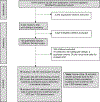Hepatocellular Carcinoma Incidence in Alcohol-Associated Cirrhosis: Systematic Review and Meta-analysis
- PMID: 35940513
- PMCID: PMC10792532
- DOI: 10.1016/j.cgh.2022.06.032
Hepatocellular Carcinoma Incidence in Alcohol-Associated Cirrhosis: Systematic Review and Meta-analysis
Abstract
Background & aims: Alcohol is one of the leading causes of hepatocellular carcinoma (HCC). However, pooled estimates of HCC incidence in alcohol-associated cirrhosis have not been evaluated systematically. We performed a pooled analysis of time-to-event data to provide robust estimates for the incidence of HCC in alcohol-associated cirrhosis.
Methods: Medline, Embase, Cochrane Central Register, Scopus, and Web of Science were searched from inception to August 2021. Individual patient data were reconstructed from published Kaplan-Meier curves, and a pooled analysis of cumulative HCC incidence was performed using a random-effects model.
Results: We screened 5022 articles and included 18 studies (148,333 patients). In the pooled analysis, the cumulative incidence of HCC in alcohol-associated cirrhosis at 1, 5, and 10 years among studies that accounted for the competing risk of death without HCC was 1%, 3%, and 9%, respectively. A secondary analysis by traditional meta-analysis determined that the HCC incidence rate was higher in cohorts enrolled in a HCC surveillance program (18.6 vs 4.8 per 1000 person-years; P = .001) vs those who were not enrolled in a surveillance program. Meta-regression showed that diabetes, smoking, variceal bleeding, and hepatic decompensation were associated with a higher risk of HCC.
Conclusions: Our analysis determined that the 5- and 10- year cumulative risk of HCC in alcohol-associated cirrhosis was 3% and 9%, respectively, with a higher incidence in cohorts that were enrolled in a HCC surveillance program. These data should be validated further in large prospective studies, and may have important implications for HCC screening and surveillance among patients with alcohol-associated cirrhosis.
Keywords: Alcohol; Cirrhosis; Hepatocellular Carcinoma; Incidence.
Copyright © 2023 AGA Institute. Published by Elsevier Inc. All rights reserved.
Conflict of interest statement
These authors disclose the following: Daniel Q. Huang has received funding support from the Singapore Ministry of Health’s National Medical Research Council under its National Medical Research Council (NMRC) Research Training Fellowship (MOH-000595-01).
Figures


References
-
- Singal AK, Mathurin P. Diagnosis and treatment of alcohol-associated liver disease: a review. JAMA 2021;326:165–176. - PubMed
-
- Crabb DW, Im GY, Szabo G, et al. Diagnosis and treatment of alcohol-associated liver diseases: 2019 practice guidance from the American Association for the Study of Liver Diseases. Hepatology 2020;71:306–333. - PubMed
-
- Seitz HK, Bataller R, Cortez-Pinto H, et al. Alcoholic liver disease. Nat Rev Dis Primers 2018;4:16. - PubMed
-
- European Association for the Study of the Liver. EASL clinical practice guidelines: management of alcohol-related liver disease. J Hepatol 2018;69:154–181. - PubMed

